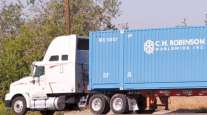Managing Editor, Features and Multimedia
AI and Trucking’s Future Workforce
As artificial intelligence grows more sophisticated and becomes increasingly accessible to businesses of all types, it will usher in significant changes across a broad spectrum of industries, including freight transportation. But what will this change look like in the years and decades ahead? In the public’s imagination, the rise of AI still tends to conjure up typically dystopian visions of the future offered up by pop culture, such as “The Matrix” and “The Terminator” films.
And even outside the realm of fiction, some people continue to hold less fanciful but still ominous views that AI could render human workers obsolete — and unemployed.

Clevenger
In the transportation industry, this vision sometimes takes the form of unmanned trucks controlled by computers and dispatched automatically by AI load-matching programs.
While AI and automation are indeed making inroads in trucking, the future we will experience will be far less stark.
AI will not replace workers so much as it will help them work better and more efficiently.
Over time, AI-enabled software will handle more of the tiresome, mundane tasks that require precision but little thought, while humans increasingly focus on solving complex problems and interacting with customers.
This AI will operate behind the scenes, recognizing subtle patterns within massive amounts of data and pointing out anomalies that require the attention of a human worker, who likely won’t even spare a thought to the AI algorithms guiding the software.
Put simply, AI is an opportunity to enhance jobs, not just eliminate them.
In fact, AI and other forms of technology could become powerful tools to recruit a new generation of workers, especially in an industry like ours that already is struggling with labor constraints.
We hear it constantly: Trucking companies would expand their businesses if only they could find more drivers to pilot their trucks. A shortage of service technicians also has become a headwind for the industry.

AI and robotics — as well as trucks — were on display at CES 2019. (Seth Clevenger/Transport Topics)
Despite the availability of these well-paying jobs, not enough job seekers are even considering them. Part of the problem is many young people aren’t simply looking for any reliable job, especially at today’s low unemployment levels. They’re looking for work that is interesting and challenging and, in many cases, at the forefront of innovation.
Trucking needs to present itself that way.
This industry is the lifeblood of the economy. Store shelves are empty without trucks delivering the freight. But trucking also is becoming increasingly high-tech.
Modern trucks are equipped with a plethora of onboard sensors and active safety systems, and freight operations utilize telematics, data analytics and other forms of technology.
The broader public doesn’t seem to be fully aware of these advances.
But that may be changing.
Commercial vehicles had a significant presence at the massive CES technology show in January in Las Vegas, where technology professionals of all stripes saw trucks equipped with automated driving and electric propulsion systems.
Of course, technology for technology’s sake will never work in trucking. At its core, trucking isn’t about being flashy — it’s about getting the job done in a safe, efficient and profitable manner.
But positioning the trucking industry as a venue for cutting-edge technologies will make transportation careers more appealing to the next generation of truck drivers, repair technicians, logistics planners and business leaders.
Our industry must sell itself not only as an indispensable industry but as a modern, innovative field with exciting career opportunities.
And for the most part, AI will enable and enhance those job opportunities, not replace them.
At least until the machines begin their uprising.




